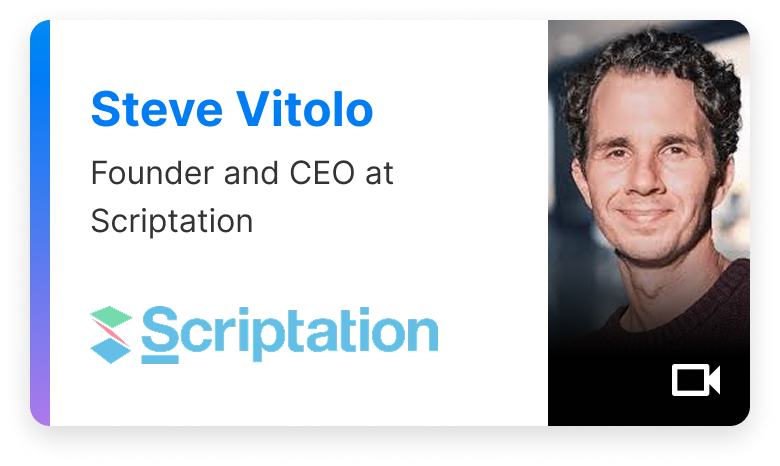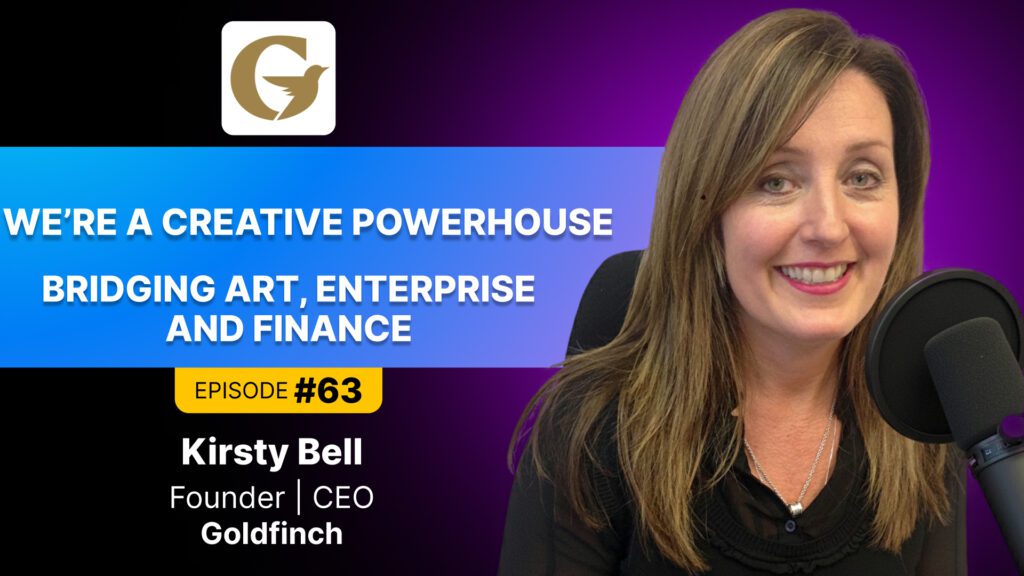Paper is still our biggest competitor. But Scriptation saves productions 5–10 hours per week—time they can now spend making better creative decisions.
Podcast Chapters
| Timestamp | Chapters |
| 00:00 | The Genesis of Scriptation |
| 05:47 | Collaboration Features and Annotations |
| 15:03 | Global Reach and Market Expansion |
| 18:07 | Industry Applications and User Groups |
| 30:47 | The Importance of Data in Script Production |
| 35:01 | Integrating AI into Scriptation |
| 39:14 | Celebrating Achievements: The Emmy Award |
| 41:33 | Looking Ahead: Industry Outlook for 2025 |
The biggest misconception is that script revisions are simple. On some productions, there are over 100 revisions! We make that process seamless and efficient.
💡 Key Takeaways
🔹 End-to-End Efficiency – Scriptation saves directors, producers, and cinematographers hours of manual re-annotation.
🔹 Industry-Wide Adoption – Used on Game of Thrones, Succession, and Saturday Night Live, among others.
🔹 Collaborative Workflow – Teams can share and overlay script notes without losing track of revisions.
🔹 Security for Studios – The enterprise version ensures encrypted access and controlled distribution.
🔹 Global Expansion – 40% of Scriptation’s users come from international markets, with key growth in Europe & Latin America.
🔹 AI-Powered Productivity – New AI tools help streamline script changes and learning.
🔹 Sustainability Gains – By reducing paper use, Scriptation significantly lowers the environmental footprint of productions.
🎙️ SoundBites: 5 Key Quotes from the Interview
📌 “A 60-page script revision shouldn’t mean rewriting all your notes. That’s exactly what Scriptation solves.”
📌 “One Game of Thrones episode had over 100 revisions—Scriptation saved them.”
📌 “Our biggest competition? Still paper.”
📌 “With 40% of our user base outside the US, global adoption is growing fast.”
📌 “AI will help, but it won’t replace human creativity in script collaboration.”
About Scriptation
🎬 Why Studios Should Use Scriptation for Their Next Episodic Series?
✅ Faster Script Revisions – Instantly transfer notes from one draft to the next.
✅ Seamless Collaboration – Share notes with directors, DPs, and ADs effortlessly.
✅ Enhanced Security – Enterprise solutions keep scripts & annotations protected.
✅ Better Creative Focus – Save time on admin tasks & focus on making great content.
✅ Sustainability Benefits – Go digital and significantly reduce paper waste on set.
Interview with Steve Vitolo, Founder & CEO of Scriptation
In this interview, Steve Vitolo, CEO and Founder of Scriptation, shares how his background in TV writing inspired a tool now used across Hollywood productions. He reflects on the unique evolution of Scriptation, its deep industry roots, and the future of AI in script-based workflows. This is the written version of the Vitrina podcast interview with Steve Vitolo, Founder & CEO of Scriptation—summarized for quick reading. The transcript has been reformatted into a Q&A style for clarity.
Vitrina:
What is Scriptation, and what core problem does it solve in the production process? How does it work, and how do people interact with it?
Steve Vitolo:
“If you’re on a production — a director, producer, cinematographer — you get a 60-page script and make a bunch of notes. Then a new revision arrives, and you panic — how will you rewrite all your notes? Scriptation allows you to annotate scripts digitally via PDFs, and when a new draft comes out, it automatically transfers your notes across versions.
You download Scriptation from the Apple App Store for iPad, iPhone, or Mac — it’s designed specifically for film and TV. Beyond note transfers, it has lining tools for script supervisors, line learning tools for actors, and tagging features that can export data into other apps. We’re like the Adobe of film and TV.”
Vitrina:
What inspired Scriptation’s creation? Was it based on your personal experience in the industry?
Steve Vitolo:
“My background is as a writer’s assistant and script coordinator, working on TV shows for over 15 years. The spark came while working on a multicam comedy — we were printing 50-page scripts daily for over 100 people, wasting thousands of sheets of paper and hours of manual re-annotation.
I thought if we could transfer notes across revisions, we could save time and reduce paper usage. It started as a side project in 2013. We launched the app in 2016, and I went full-time in 2018 — around the time subscriptions became viable in the App Store.”
Vitrina:
How does Scriptation integrate into real-world production workflows? Who uses it, and what’s the collaboration flow like?
Steve Vitolo:
“We’re used across productions — writers create the script, the coordinator distributes it, usually as a PDF, and users import that into Scriptation. Instead of paper scripts and highlighters, teams walk around with iPads and Apple Pencils. Scriptation mimics the physical experience but adds automation.
It’s mostly direct-to-consumer — users download and subscribe themselves. We’re used by everyone: directors, producers, cinematographers, script supervisors, writers — basically anyone making heavy notes. Big shows like Game of Thrones, Succession, SNL use us. In fact, Game of Thrones had over 100 script revisions in one season — Scriptation saved them.”
Vitrina:
How does Scriptation handle collaboration, real-time updates, and large script changes?
Steve Vitolo:
“Most notes are for personal use, but we support collaboration via layers — like Photoshop. You can overlay different layers for meetings, departments, or teammates. A director and DP, for instance, can share and toggle between each other’s notes.
We developed Live Layers for SNL — not real-time sync, but you can ‘push’ your notes to teammates when ready. For heavy script changes, we’ve built sophisticated transfer algorithms with scene recognition and PDF mapping. Even with scene relocations, annotations are moved correctly. It’s constantly evolving, but we think we’re the best at it.”
Vitrina:
How intuitive is the app? Do users require training? And how accessible is it globally?
Steve Vitolo:
“Our goal is to need zero training. We customize toolbars based on user roles, offer guided tours and quick start guides. But honestly, about 50% of users skip the tours. It’s an ongoing challenge — users want to jump right in.
We’re globally available via the App Store and localized in Spanish, Portuguese, and French. 40% of our users are outside the US and Canada — especially in UK, Australia, New Zealand, Germany, and Brazil. One challenge is that many regions like Latin America are Android-heavy, and Scriptation is Apple-only for now.”
Vitrina:
Is Scriptation integrated with other tools or workflows? How does it handle downstream data or enterprise demands?
Steve Vitolo:
“We’re working on integrations — for example, with ShotLister. Directors can export shot lists from Scriptation and update them automatically with script revisions. We also integrate with Synapse for AD scheduling.
We joined the MovieLabs 2030 vision to be part of the interconnected workflow ecosystem. On the enterprise side, we’ve built modular permissioned systems — encryption, remote file deletion, audit logs — used by Apple TV, for example. Studios usually adopt it when production teams demand it, especially over security concerns.”
Vitrina:
Which genres and sectors benefit the most from Scriptation? Are there newer emerging use cases?
Steve Vitolo:
“Our core is episodic and feature films due to the revision volume. SNL uses us for last-minute collaboration. We’ve also seen adoption in Broadway, gaming, and other live formats where scripts evolve fast.
Often, users come from pen and paper, love the smooth transition, and then request more — like lining tools or timecode support. We’ve built features based on that feedback, always listening to what our users want next.”
Vitrina:
How do large studios engage with Scriptation? Is there industry education needed?
Steve Vitolo:
“Studios are a bottom-up use case — crew uses Scriptation, and then studio security steps in. Initially, execs didn’t even understand the problem — they weren’t on set. Once people demand it, we provide secure enterprise solutions.
We created a Team Studio model for Game of Thrones, and now have a web-based enterprise solution with modular controls. But yes, there’s still a lot of education needed at the studio level.”
Vitrina:
What’s Scriptation’s pricing model for individuals, teams, and enterprises?
Steve Vitolo:
“Industry Pro is $99/year or $15/month — works across Apple devices. There’s a free version as well. We offer mid-tier licensing for productions wanting to buy in bulk. Enterprise pricing is custom and includes advanced security, device controls, and auditability.”
Vitrina:
Did the strikes affect your business? How important is international diversification?
Steve Vitolo:
“Yes, we definitely saw usage drop during the strikes. But our international footprint saved us — we still had an up year. Direct-to-consumer subscriptions helped keep the business stable. Diversification was key.”
Vitrina:
Has Generative AI impacted Scriptation’s product development?
Steve Vitolo:
“We built a GenAI feature to describe differences between two scenes in plain English. Some users were wary, so we made it opt-in and secure. We’re now exploring AI prompts inside the app, allowing intelligent responses about the script.
We’re experimenting with voice tools, possibly partnering with DeepDub for better actor line learning. But we’re cautious — AI should augment, not replace. No hallucinations — only helpful, accurate functionality.”
Vitrina:
Tell us about winning the Emmy! And what’s your outlook for 2025?
Steve Vitolo:
“Winning the Emmy was huge. We won for our note-transferring technology — had to submit, get testimonials, demo it over Zoom. Now we just say: ‘Emmy Award-Winning App.’ It really helps the brand.
As for 2025, we’re seeing more productions return — just not in LA. There’s a shift to Atlanta, Texas, elsewhere. We’re building out AI tools thoughtfully, focused on saving users time. And we’re in a constant brand awareness campaign — we’re even on TikTok now.”
In Conversation With





 Malibu, United States of America
Malibu, United States of America




